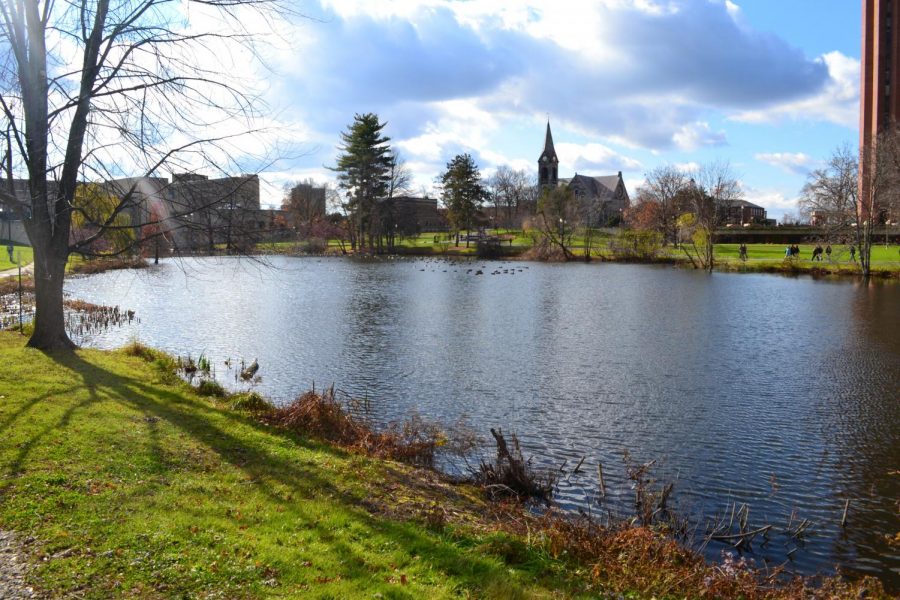While the Alliance Against Ableism first met in February 2019, it has spent its second semester at the University of Massachusetts solidifying its goals and furthering its activism for students with disabilities.
The Alliance currently has almost 40 members, including faculty members, undergraduate and graduate students. Deanna Ferrante, a senior psychology student and a founding member of the organization, said the inspiration came from her role at the assistive technology center, which offers instruction, training and support for disability software.
“A lot of students were telling me about their needs on campus, a lot of which weren’t being met,” Ferrante said, adding that disabilities can exist in many forms and not just those commonly documented by disability services.
At weekly meetings, Ferrante said the group started as a place for people to share their experiences with ableism, a form of discrimination against people with disabilities. “Then we began asking, ‘where do we want to see change?’”
According to David Paquette, a master’s student in the College of Education who joined the organization in the fall 2019 semester, the primary objective of the alliance is to support graduate and undergraduate students facing ableism on campus. Structures of power, he explained, exclude these students from shaping the policies which impact them.
In a physical context, these policies might be where automatic doors and ramps are placed on campus. In an academic context, Paquette noted, the way information is delivered often fails to accommodate all students. Professors “don’t always consider universal design,” he said, explaining that universal design ensures the material is accessible to all people regardless of disability.
“Ableism exists everywhere. It’s a subconscious thing,” Paquette added.
Julie Bak, an undergraduate student in communication disorders, said she became involved in the Alliance to ensure all the people affected by ableism have the opportunity to be heard. After taking a class at UMass titled “Embracing Diversity,” Bak was disappointed when the material only focused on race, asking, “Why do they choose to continue using the term ‘diversity’ when so many students aren’t even mentioned?”
Disability, the group explained, is an identity on campus that receives little attention from the administration and community. Bak explained the group’s goal wasn’t to move away from sexism or racism as critical issues, but to ensure the community recognizes ableism is also a critical issue. Paquette said support for students with disabilities is often seen as “transactional,” with students going in and out of offices with temporary solutions.
“The University doesn’t support disability as an identity,” Paquette said. “We want to make this a more common conversation.”
Ferrante added that a campus climate survey mentioned disability “maybe six times” compared to numerous mentions of race and gender.
In the most recent campus climate survey, the University reported that undergraduates with disabilities, particularly those “with a mental health disability, sensory disability or multiple disabilities,” reported lower levels of belonging and higher levels of negative treatment. One in four students with disabilities reported instructors stereotyping, making negative remarks or telling jokes frequently about their identity.
“We’re trying to push it [ableism] to be on the same level of attention as racism and sexism,” Ferrante said.
Currently, Paquette said, there are around 3,000 students registered with the disability office, with a variety of disabilities. When discussing potential issues and solutions regarding ableism on campus, Paquette said it was helpful “to have people with many disabilities in the room.”
“I don’t always see these same things,” Paquette added.
Looking forward, the Alliance wants the UMass community to “recognize ableism as it is engrained in every aspect of life [whether] we realize it or not,” according to Bak.
Bak brought up the example of service dogs, noting that many students don’t know it is distracting and possibly dangerous to touch or talk to a service dog at work.
“[The dog] is there to help their person, not be a pet,” Bak said.
Ferrante added the groups has also talked about having a space for students to have discussions about ableism and get more information about the resources available to them.
“Kind of like a cultural center,” Ferrante said. “A place where students can communicate with each other and validate their identity.”
Bak said students interested in reaching out to the Alliance can contact the group via email at [email protected] or on Instagram at @allianceagainstableism.
Kathrine Esten can be reached at [email protected] and followed on Twitter @KathrineEsten.





















Ed Cutting, EdD • Nov 10, 2019 at 11:48 am
The problem with Disability “Services” is that it has always been more concerned about issues of race, sex, and sexual orientation — while purporting to be about issues of disability.